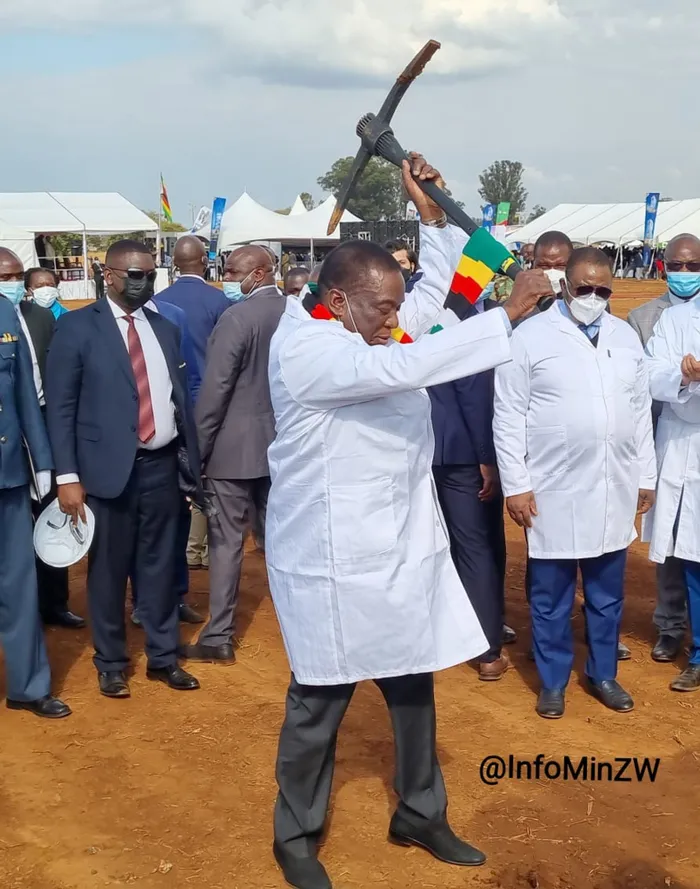Weekly African report: Phala Phala to Harare

Picture: Ministry of Information Zimbabwe/Twitter – Zimbabwean President Emmerson Mnangagwa, rolls up his sleeves on September 7, 2022. Mnangagwa has commissioned construction of the USD $500 million Cyber City as Zimbabwean authorities continue their fight to shake off the yoke of the economic sanctions imposed on them and the country by the United States and the European Union.
Picture: Ministry of Information Zimbabwe/Twitter – Zimbabwean President Emmerson Mnangagwa has commissioned construction of the USD $500 million Cyber City. The UAE-based industrial conglomerate Mulk International has bankrolled the development as Zimbabweans struggle to survive in the face of heavy US-led sanctions.
By Sihle Mavuso
In another dramatic political week, readers were spoilt for choice for political news. Notably, the Phala Phala scandal continues to make headlines despite repeated attempts by President Cyril Ramaphosa and his advisors to suppress it.
Also hogging the news in South Africa is the nomination process for the ANC ahead of next month’s elective conference.
Regarding the elective conference, it is becoming clear that the former minister of health and senior ANC national executive committee (NEC) member, Dr Zweli Mkhize will give Ramaphosa a run for his money.
However, it is worth watching the campaigns of Lindiwe Sisulu and Dr Nkosazana Dlamini Zuma as they are likely to join forces to oust Ramaphosa who has been left on his back foot following the Phala Phala scandal and the worsening load-shedding by Eskom.

Sanctions weigh heavily on Zimbabweans
On the African continent, Zimbabwean authorities continue their fight to shake off the yoke of the economic sanctions imposed on them and the country by the United States (US) and the European Union (EU) over human rights violations that started in 2000 when war veterans invaded white-owned farms.
The violation later extended to 2008 when ZANU-PF allegedly rigged the election and engaged in violence to force people into submission.
Now authorities are engaging in frantic efforts to get the sanctions lifted, saying they are weighing heavily on the country and are hindering efforts to revive the economy.
In their bid, Zimbabwe has roped in the Southern African Development Community (SADC) to lobby for the removal of sanctions. They argue that the sanctions are affecting other neighbouring countries as desperate Zimbabweans flee to their countries, thus causing social and migration disorder.
For ZANU-PF, if the sanctions are removed ahead of the 2023 elections, that would a major victory as they can use that to fend off an electoral challenge from Nelson Chamisa of the Citizens Coalition for Change (CCC).

Silencing the guns in Tigray
In the horn of Africa, the Ethiopian government and Tigray rebels have agreed to cease fighting after two years of bloodshed.
The dramatic agreement was reached after days of peace talks in South Africa, which was assigned by the African Union (UN) to facilitate and host the talks. The truce paves way for the restoration of social order and resumption of the provision of humanitarian aid in the battles zones.
It is expected that, shortly, the truce will become a permanent peace deal. However, the conditions for that are not yet known.
ANC nominations and the journey ahead
With a few weeks left for ANC branches to conclude their nominations, the party has also tightened the screws over funding for internal campaigns.
The party has written to members who intend to run for top six positions and to be in the NEC to keep records of their sources of funding and submit them for scrutiny.
Although it was not stated in the letter to branches why that decision was taken, it appears that they are trying to avoid a repeat of the CR17 funding debacle of 2017. In that debacle, Ramaphosa allegedly raised almost R1 billion for his campaign and there are allegations that the money was used to pay branches.
The CR17 bank statements were later sealed by the courts, but that failed to deter people from asking questions about it. It has even been alleged that some of those who donated money to the campaign have been handsomely rewarded by the Ramaphosa administration.

Phala Phala and the fallout over it
In other news for this week, the Phala Phala scandal is refusing to go away. Every day there is a new dimension to it.
A few days ago the scandal dragged investigator Paul O’ Sullivan, who it is alleged, has played a role in Ramaphosa’s illegal and clandestine efforts to recover the dollars that were stolen from his farm in Limpopo in February 2020.
Piling pressure on Ramaphosa over the matter, former deputy president, Kgalema Motlanthe, has said the president must come clean over the scandal. With Motlanthe making such a comment, it appears that Ramaphosa will spend the run-up to the elective conference of the ANC trying to fend off the matter, thus defocusing him.
Fears of political killings in Mpumalanga
Although political killings have been largely confined to the province of KwaZulu-Natal, it appears that the problem is now spreading to other provinces like Mpumalanga.
On Friday the deputy chairperson of the ANC Gert Sibande region was shot dead in Piet Retief near the South Africa-Eswatini borderline. Although it is not clear why he was killed, it is known that the region, more especially the Mkhondo (Piet Retief) zone, has been politically volatile.
The wrangling between ANC factions has seen the party failing to govern the Mkhondo local municipality, even though it has a clear majority. One of the factions opted to vote for an independent mayor, Mthokozisi Simelane, rather than supporting their own.
Also in the same municipality, the ANC recently expelled six councillors for defying its mandate on who should be mayor. That has heightened tensions in the region as two factions are now engaged in open hostilities.
Mavuso is a senior current affairs journalist at IOL News
This article is original to the The African. To republish, see terms and conditions.